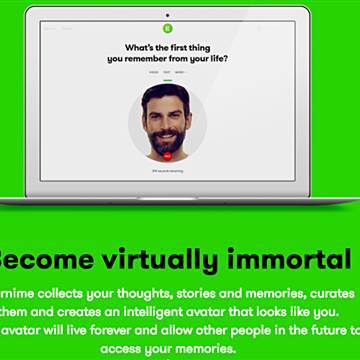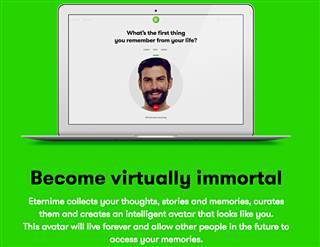The theory that humans will eventually be able to upload our brains to computers has fascinated futurists and neuroscientists for years. By transferring our minds into machines we could live forever, unmoored from the feebleness of our physical bodies. The concepts of death and bereavement as we know them now would cease to exist.
Currently the idea lives within whitepapers and sci-fi movies, and the only thing (most) researchers agree on is that it won’t be possible for a really long time. But while we’re far from achieving that pinnacle of immorality, technology in the –and-now has already started giving us a sliver of eternal life while shaping how we grieve our loved ones if and when they die.
Related: How Computers are Learning to Predict the Future
The Silicon Valley-startup Eterni.me aims to let people preserve their “most important thoughts, stories, and memories” in an artificially intelligent system that could ultimately communicate conversationally with others once its creator is gone. Such an avatar could both soothe the bereaved and allow future generations to know much more about their great-great-grandparents.


Since the company had a splashy launch two years ago it has progressed with crypt-like quietness. Their site is mostly unchanged, save for the counter of people signed up for early access that rises each day. But now it says it plans to launch revamped version of its app to a test group in early 2017. The app will connect to a person’s Facebook account (with other social integration planned) and launch micro-conversations based on their daily activities. Ultimately that process will build the AI’s understanding of its subject, and be able to function like a smarter, more personalized version of the chatbots you can already interact with today.
“We chose this approach because we would like to help people solve the ‘blank page syndrome’ we have often seen when somebody tries to write in their diary,” explains Eterni.me founder Marius Ursache. “We want to encourage people to start curating their digital legacy and we will do that by triggering conversations based on previously collected data of what they did, felt, or experienced.”
Though Eterni.me’s new app will be collecting all this information, the neural network backbone won’t be able to turn that mass of unruly data into engaging conversations yet.
Related: How the Tech Industry is Tackling the Cancer Moonshot
“The artificial intelligence that we need requires a lot of effort and time — it may take years,” Ursache says. “A lot of the people who expressed interest in Eterni.me don’t have this time. This forces us to use more or less the the approach of the cryonics initiatives — preservation first, technology second.”
Meanwhile, a semblance of the company’s vision has already come to “life.”
Earlier this year, entrepreneur Eugenia Kudya created an AI-powered chatbot in honor of her friend Roman Mazurenko, who died tragically in 2015. Kudya and other mourners could “speak” with Roman by talking to the bot or asking it questions — its responses would be based on the thousands of texts messages and photos she had fed the neural network controlling its artificial intelligence.
While the Roman bot couldn’t narrate stories in the same way that Eterni.me envisions, it wrote in his voice. Talking to the bot helped Kudya grieve and made her feel more connected to her friend.
Inspired by the personal conversations that other people had with Roman’s bot, she’s now working on Replika, a new product that, like Eterni.me, will collect a person’s stories and memories and learn to mimic their conversational mannerisms by texting with them. The bot would first ask you about the past and eventually prod you about your daily life. Your friends could talk to your Replika, too, asking it personal questions or using it to schedule plans with the real you.
“It’s all about making people a little bit more open about themselves … a little more vulnerable,” Kudya says. “Now even the first Replikas we have on the app can tell you a lot about the person that trained it.”
Related: Why Extinction Doesn’t Have to Be Forever Anymore
The goal of the platform, she explains, isn’t to let everyone create their own “Roman” that will live on after they die, but to give everyone a kind of “friend” that is there every day to talk to, to make you “more connected with your friends and yourself.”
But intention or not, a person’s Replika bot would be able to keep responding like you and telling your stories after you died in the same way that Eterni.me’s avatars could.
“Imagine if someone had an extensive, almost inexhaustible archive of conversation available with the deceased.”
Over 100,000 people have reserved their Replika “name” and 17,000 applied for early testing of the app, but only 1,200 were given access to the beta version. Kudya was vague about when she thinks the technology will actually be good enough for the general public.
The natural progression of Eterni.me or Replika’s ideas would be to combine the AI with realistic digital 3D avatars (something Eterni.me eventually plans to do to, but has back-burnered while it works on the first part of its mission). Facebook is researching how to create life-like virtual reality avatars as are a host of different startups, including one called XXarray that explicitly envisions helping people create a digital legacy.
Long-time VR researcher Jacki Morie coined the phrase “the ultimate selfie” to describe how she predicts that current technologies could eventually combine to create digital avatars that would not only would look like us, but move like us, and learn from us, too.
Related: Is Perfecting Artificial Intelligence This Generations Space Race?
She imagines that in the not-so-distant future, when using an avatar in VR is fairly common practice, people will be able to train a digital surrogate that could live on after they’re gone.
“You’ll be scanned and have this 3D construct that can then walk around in virtual worlds and it will retain the things that you did within an AI,” she says. “This kind of avatar could become a repository for our experiences and our memories.”
While the idea of talking to a dead relative through a digitized ghost may seem creepy — edging into bizarre “uncanny valley” territory — experts say that, on principle, it’s actually a completely natural progression of the way that people have always grieved.
…







